
🌍 The Multipolar World Explained:
Welcome to the Geopolitics Multiverse — where alliances shift faster than TikTok trends and peace talks look like Coachella livestreams.
Remember when geopolitics felt like a predictable 90s action flick? One hero (the USA), one cartoonish villain (the USSR), and a bunch of countries serving as silent background props. Yeah, that era ended faster than your free Netflix trial.
Fast-forward to 2025, and it’s no longer a movie — it’s a chaotic, unscripted global reality show. Meme diplomacy is a thing, hashtags double as foreign policy, and entire wars unfold like binge-worthy series.
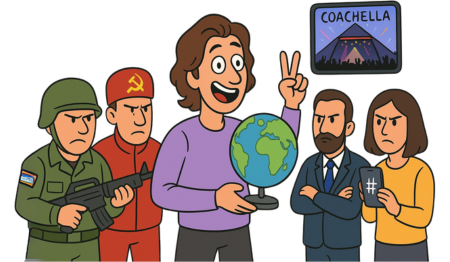
🎭 The Geopolitics Crossover Event
Today’s world is a full-blown multiverse crossover:
- Kyiv is fighting a war while also auditioning for NATO’s next season.
- Gaza has become the world’s most-watched group chat, with China, Turkey, and Saudi Arabia all dropping hot takes.
- Caracas is hosting its own subplot where the US, Russia, and China compete to see who can unlock Venezuela’s oil DLC.
Forget the tidy Cold War script — this is the streaming era of geopolitics: messy, binge-worthy, and full of plot twists no one saw coming.
Coming up next: Gaza’s messy group chat diplomacy, Kyiv’s high-budget war season, and Caracas’ oil DLC that everyone wants to unlock. Buckle up — there’s no skip button.
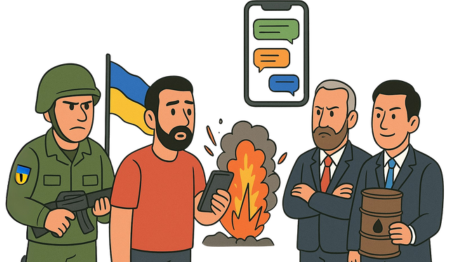
Gaza and the New Middle East Balance
Once upon a time, Gaza headlines were something you scrolled past on your way to cat videos.
Today? Gaza is the group chat notification you can’t mute — and it’s blowing up with voice notes, hot takes, and unsolicited memes at 3 a.m.
This latest round of fighting turned into a full-blown geopolitical casting call: Washington showed up playing its usual character (“I stand with Israel”), but Turkey, Qatar, and even Saudi Arabia decided to freelance as peacemakers-slash-power-brokers.
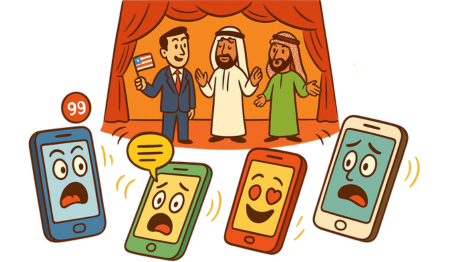
When Beijing Slid into the Chat
And then it got spicy: Beijing casually slid into the DMs with “peace plans,” Moscow photobombed the scene just to say “Still here!” — and suddenly, for the first time in decades, the Middle East stopped orbiting around Washington and started acting like its own solar system.
Riyadh is brunching with Beijing, Ankara is juggling NATO commitments while subtweeting Tel Aviv, and Doha is basically live-streaming ceasefire talks like it’s the World Cup.
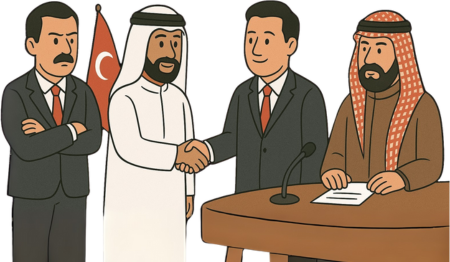
Remember the Abraham Accords?
Once upon a time, Washington could gather half the Middle East for a White House photo-op and call it diplomacy.
Fast-forward to 2025 and that vibe feels like your old MySpace profile — technically still online, but no one’s logging in.
The new influencers are Riyadh, Doha, and Ankara, and their algorithm is about balancing East and West — while cashing in on both ad networks.
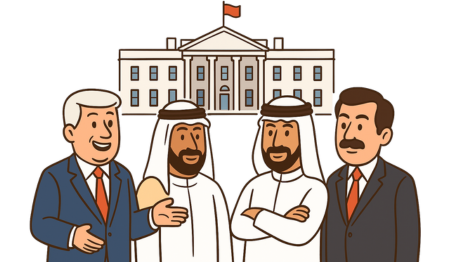
Diplomacy, But Make It WhatsApp
Even the ceasefires look different now: less “signed on the White House lawn” and more “negotiated in a WhatsApp group with China, the UN, and a few Gulf royals all dropping emoji reactions.”
The message is loud and clear: Washington is no longer the only admin in the group chat. Gaza has become the stage where everyone — EU diplomats, Iranian negotiators, African Union mediators — wants a speaking role.
Spoiler: the script is no longer written just in English.
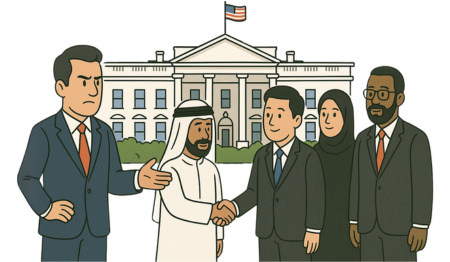
Kyiv: Reluctant Reality Show Star
Ukraine isn’t just a warzone — it’s the longest-running political binge-watch of modern history.
Think Game of Thrones but with fewer dragons, more tanks, and sanctions that look like Excel spreadsheets on steroids.
Season 1: Crimea
The pilot dropped in 2014 when Russia annexed Crimea — Moscow’s big “plot twist.” It shocked everyone and set up the whole series arc.
Season 2: The Full-Scale Invasion
2022 was the season finale no one wanted but everyone watched, popcorn in hand. Suddenly, Kyiv was the main character in the global drama.
Season 3: Military Aid Madness
Since then, the West’s been tossing Ukraine weapons like Oprah giving out free cars:
“You get a Javelin! You get a HIMARS! Everybody gets a tank!”
The Vibe Shift
This is bigger than hardware. Ukraine became the symbol of standing up to the bully. For Washington, not backing Kyiv would be like letting the villain win the finale — politically unthinkable. No U.S. president wants to be roasted on late-night TV for “losing Europe.”
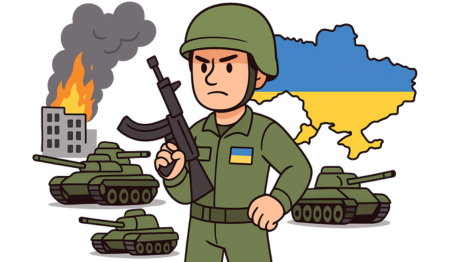
💸 Money, Weapons, & More Money
Here’s the part that makes taxpayers spit out their coffee — Washington has sent tens of billions of dollars to Ukraine. We’re talking weapons, ammo, drones, humanitarian aid — basically a shopping spree that would make a Kardashian jealous.
And this isn’t just a one-time splurge. The aid packages keep rolling out like Netflix renewals — just when you think the season’s over, Congress drops another billion-dollar sequel.
Meanwhile, Americans back home argue over potholes, healthcare, and student loans, while D.C. keeps writing checks to Kyiv faster than you can say “deficit spending.” But here’s the cold calculation: it’s cheaper to ship weapons than to ship troops. For Washington, sending money is ugly math — but it beats explaining body bags on the evening news.
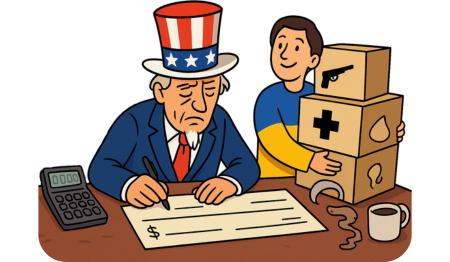
What About the Rest of the World?
Here’s where the plot got juicy: the rest of the world didn’t exactly join the fan club. China pulled a classic “neutral but networking behind the scenes,” India bought Russian oil like it was on Black Friday sale, and Brazil played peacemaker while happily exporting soy and beef to anyone with cash. Africa? Quietly cutting grain deals with Moscow like it was just another Tuesday.
This was the moment everyone realized we’re no longer in a unipolar world. Washington’s moral outrage didn’t go viral globally — the Global South had its own feed. Their questions weren’t “Whose side are we on?” but “How do we keep food prices down?” and “Can we leverage this mess for better trade deals?”
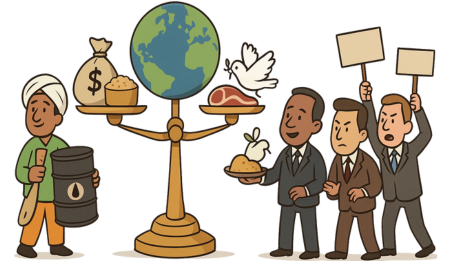
🎥 The Meme-ification of War
And then came the Information War. Western media sold it as a clash of democracy versus authoritarianism. Russian state TV spun it as resisting NATO’s creeping expansion.
Meanwhile, TikTok stitched both sides into memes, turning geopolitics into a weird mix of tragedy and viral content. For Gen Z, Ukraine became less about borders and more about who had the better drone footage and soundtrack.
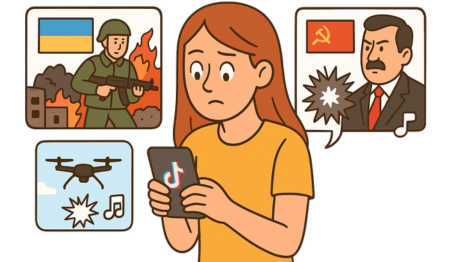
🌍 Ukraine: The Multipolarity Test Lab
By mid-2025, the war had turned into background noise for many countries — but strategically, it re-wired the world order. NATO expanded, but so did BRICS+. Sanctions hurt Russia, but also pushed it closer to China, Iran, and India.
Ukraine, once seen as just a buffer state, became the testing ground for new weapons, new diplomacy, and new alliances.
In other words: Ukraine isn’t just a battlefield — it’s the world’s first real-time, interactive demo of multipolarity. Everyone’s playing — some openly, some in the shadows — and there’s no single director calling the shots anymore.
And speaking of players — no one’s been playing 4D chess in this game quite like China
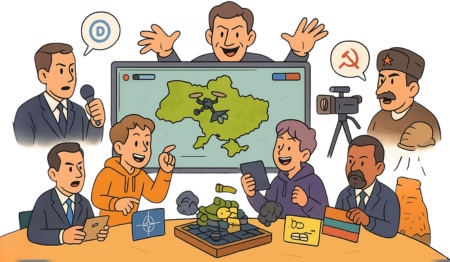
🐉 China: The Reluctant Best Frenemy
If geopolitics were a telenovela, China would be the character who shows up late to the party, pours everyone a drink, and then quietly rewrites the guest list.
Beijing’s role in the Ukraine drama isn’t to pick a side — it’s to make sure both sides still need it tomorrow.
Since February 2022, China has been doing the diplomatic equivalent of saying, “Wow, that’s crazy,” while secretly taking notes and buying popcorn. They keep talking about “peace plans,” “dialogue,” and “respect for sovereignty,” but they never call out Russia by name.
Why? Because calling out your biggest energy supplier is just bad manners.
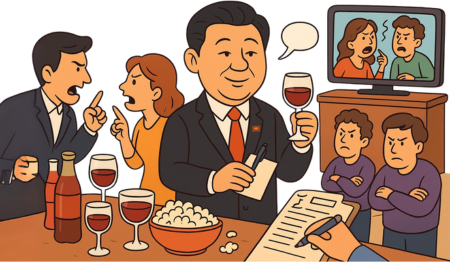
💹 Buying Cheap Oil Like It’s Black Friday
But China’s real power move isn’t just in what it says — it’s in what it buys.
Let’s be real: the sanctions on Russia have been a two-for-one sale for China. Western countries slapped price caps on Russian oil, and China said, “Don’t mind if I do.” Now, China is buying record amounts of Russian crude — at a discount — and reselling some of it abroad at a profit.
This isn’t just about cheap gas for Chinese factories; it’s about Beijing quietly building its energy security moat while Europe scrambles to find enough LNG to not freeze in winter.
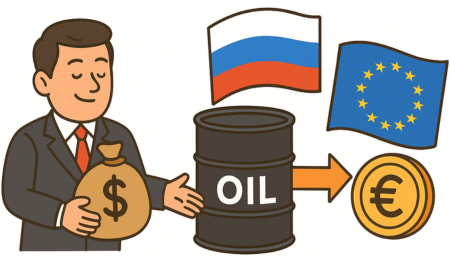
💱 Yuan Diplomacy
Every barrel that flows east instead of west is a subtle reminder that the world doesn’t revolve around the dollar anymore — or at least, not exclusively.
And that’s the real kicker: Beijing and Moscow are trading more in yuan than ever. Not because they’re trying to end the dollar’s reign tomorrow morning, but because they’re experimenting. They’re stress-testing the global financial system to see how much it bends before it breaks.

🏆 Soft Power Olympics
While Washington and Brussels look like they’re running a geopolitical improv class (“What if… sanctions, but bigger?”), Beijing is busy branding itself as the calm, rational alternative.
China hosted peace talks (or at least photo ops) with Saudi Arabia and Iran.
They sent a “peace envoy” to Europe, who mostly listened and nodded — which, to be fair, is already more diplomacy than some countries manage.
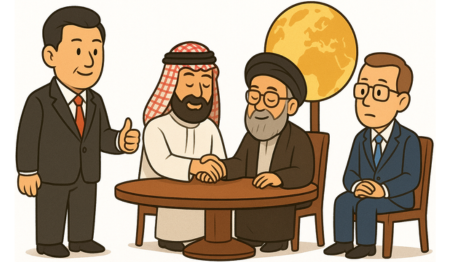
🛰 The “Adult in the Room” Act
And of course, Xi Jinping keeps inviting everyone to join China’s Belt and Road projects — like offering credit cards to college students: irresistible at first, painful later.
This calm, “we’ve-got-this” act isn’t just for show. It’s working.
A growing number of countries in Asia, Africa, and Latin America see China not just as a factory, but as a partner that doesn’t lecture them about democracy — while also giving them railways and 5G towers.
For the West, this is frustrating — like watching your ex thrive on Instagram.

⚠️ Will China Arm Russia?
Here’s the part that keeps NATO planners up at night: what if Beijing decides to stop being coy and just ships weapons to Moscow?
So far, China has been careful. They send drones, semiconductors, and civilian trucks that “coincidentally” end up on the battlefield — but no tanks, no missiles, nothing that would force Washington to put down its coffee.
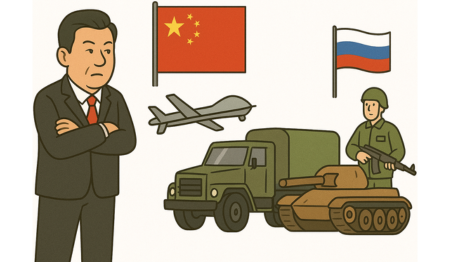
💡 Playing the Middle Game
But the longer this war drags on, the more tempting it might be for Beijing to give Putin just enough help to keep Russia in the game — not enough to win, but enough to avoid collapse.
Because a weak Russia is a problem for China too: they share a massive border, and Beijing likes having a friendly, stable (if chaotic) neighbor. China doesn’t want Russia to lose, but it doesn’t want Russia to win too much either.
A Russia that’s too strong becomes a competitor. A Russia that’s too weak becomes a liability. So Beijing plays the middle game, keeps buying oil, keeps selling microchips, keeps talking about peace, and quietly waits for the U.S. and Europe to tire themselves out.
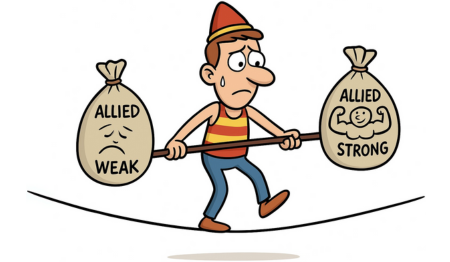
🌎 The Global South’s New Swagger
While Beijing plays the long game, the rest of the Global South isn’t just watching — they’re starting to rewrite the rules.
From Polite Bystanders to Power Players: Remember when “Global South” sounded like a polite euphemism for “poor countries”? Yeah, that’s over. These days, the Global South is the cool kid at the geopolitical party — everyone suddenly wants to sit at their lunch table.
And they’re not just mingling anymore — they’re organizing. What started as quiet frustration has turned into a movement that’s ready to challenge the old VIP section of global power.

BRICS+: The Party They’re Throwing
In the last three years, countries from Brasília to Bangkok have been walking around with a new attitude, looking at Washington, Brussels, and Beijing and saying: “You know what? We have options.”
This isn’t just vibes — it’s power. With rising populations, critical resources (oil, lithium, rare earths, even food), and faster-growing economies, the Global South is no longer waiting for invitations to the G7 gala. They’re throwing their own party — and it’s called BRICS+.
🎬 The End of Episode One
So there you have it — Kyiv, Gaza, and Caracas all playing in the same chaotic cinematic universe, BRICS+ handing out invites like candy, and the West still deciding if this is a party or an intervention.
And don’t worry, Caracas isn’t done stealing scenes — Part II is where we deep-dive into Venezuela’s oil DLC, BRICS+ expansion plans, and why even Washington might have to learn some Spanish.
💬 Wanna Use These Words Out Loud?
Enough reading — let’s speak. Join our Conversación en Español meetup: Multipolarity Is Already a Reality.
We’ll talk power, money, BRICS, and how this new world order sounds en español. Bring your slang, your hot takes, and maybe your coffee — we’ll bring the memes.
👉 Reserve your spot here — seats are limited, and you don’t want FOMO in two languages.
Multipolarity Is Already a Reality – Spanish Meetup
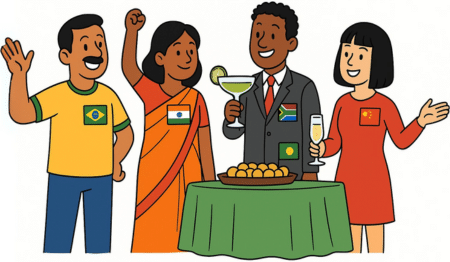
🌍 Why It Matters to Everyone
Even If You’re in Peru: This isn’t just about Ukraine or Russia — it’s about how power works now. We’re no longer in a U.S.-led unipolar world where one phone call from Washington could set the rules. Power is spreading — to Beijing, to New Delhi, to Brasília — and the Global South is no longer waiting to be told what to do.
That means new alliances, new trade routes, new rules — and yes, new risks. Your grocery bill, your gas prices, and even the headlines you wake up to are being shaped by this shift toward a messier, multipolar reality.
This article is just the opening act. Dive into the rest of Multipolarity: Our New Reality to explore how BRICS+ is growing, how sanctions are losing their punch, and how new currencies and coalitions are changing the game. The future is multipolar — time to get fluent in it.
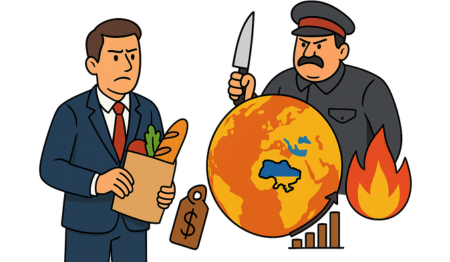
🗣️ Speak the Language of the Multipolar World
Think global, speak local — or risk sounding like that one guy at the party still quoting Cold War memes. Spanish isn’t just for ordering tacos or flirting in Barcelona — it’s the second-most spoken language on the planet, with over 500 million native speakers.
And here’s the kicker: Latin America is no longer the “quiet kid” in the class — it’s a major player in trade, energy, and diplomacy. If you want to understand how the Global South is flexing its new muscles, Spanish is your backstage pass.
At Kasa de Franko, we don’t just teach Spanish — we teach you how to talk about this stuff: BRICS, sanctions, multipolarity, all of it — in Spanish. Join one of our Spanish conversation meetups and test-drive your skills while debating who’s really running the world.
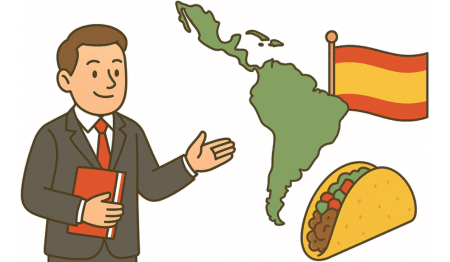
🗣️ Key Spanish Terms for the Multipolar World
Learning Spanish isn’t just about grammar drills — it’s about speaking the language of global change. Here’s a quick cheat sheet of essential Spanish vocabulary related to geopolitics, economics, and international relations so you can follow the conversations shaping this new multipolar world (and impress your friends while you’re at it).
| English | Español | Example Sentence |
|---|---|---|
| Multipolar world | Mundo multipolar | Vivimos en un mundo multipolar donde el poder está más distribuido. |
| Geopolitics | Geopolítica | La geopolítica actual es más compleja que nunca. |
| Emerging economies | Economías emergentes | Las economías emergentes están creciendo rápidamente. |
| Global South | Sur Global | El Sur Global exige mayor representación en las instituciones internacionales. |
| BRICS | BRICS | Los países BRICS buscan aumentar su influencia en el comercio mundial. |
| International order | Orden internacional | El orden internacional está en proceso de cambio. |
| Superpower | Superpotencia | China es considerada una superpotencia en ascenso. |
| Alliance | Alianza | La nueva alianza entre estos países puede cambiar el equilibrio de poder. |
| Multipolarity | Multipolaridad | La multipolaridad reduce el dominio de una sola potencia mundial. |
| Economic bloc | Bloque económico | El BRICS es un bloque económico importante para el comercio global. |
| Global governance | Gobernanza global | La gobernanza global necesita reformas para incluir más voces. |
| Trade war | Guerra comercial | Una guerra comercial puede afectar el crecimiento económico mundial. |
| Sanctions | Sanciones | Las sanciones económicas son una herramienta común en la política internacional. |
| Negotiations | Negociaciones | Las negociaciones de paz avanzan lentamente. |
| Diplomacy | Diplomacia | La diplomacia es esencial para evitar conflictos internacionales. |

🗣️ Spanish: Your Multipolar World Cheat Code
If the world is no longer run from just Washington or Brussels, why stick to just English? Spanish is the language of the fastest-growing markets, biggest protests, and most creative memes in the Global South.
Think of it this way: knowing Spanish is like getting the uncut director’s commentary on geopolitics. You’ll read Latin American news before it’s mistranslated, negotiate deals without waiting for Google Translate, and gossip about BRICS+ over a real cafecito.
And because we’re not just here to rant about geopolitics — we’re here to level you up — Kasa de Franko gives you your first Spanish class free.
🎟️ Claim it here and get ready to stop watching history from the cheap seats.

